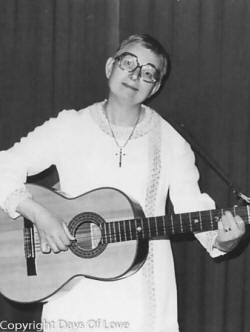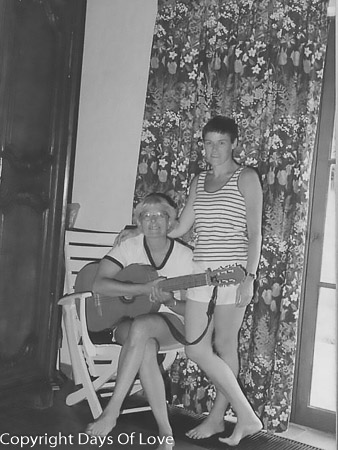

Partner Annie Pécher, buried together
Queer Places:
Catholic University of Leuven, Grand-Place 23, 1348 Ottignies-Louvain-la-Neuve, Belgio
Cheremont Cemetery, Wavre, Belgio
 Jeanne-Paule
Marie "Jeannine" Deckers (17 October 1933 – 29 March 1985),[1]
better known as Sœur Sourire ("Sister Smile", often credited as The
Singing Nun in English-speaking countries), was a Belgian
singer-songwriter and initially a member of the Dominican Order in Belgium
as Sister Luc-Gabrielle. She acquired world fame in 1963 with the release
of the French-language song "Dominique", which topped the US Billboard Hot
100 and other charts.
Jeanne-Paule
Marie "Jeannine" Deckers (17 October 1933 – 29 March 1985),[1]
better known as Sœur Sourire ("Sister Smile", often credited as The
Singing Nun in English-speaking countries), was a Belgian
singer-songwriter and initially a member of the Dominican Order in Belgium
as Sister Luc-Gabrielle. She acquired world fame in 1963 with the release
of the French-language song "Dominique", which topped the US Billboard Hot
100 and other charts.
She was born Jeanne Paule Deckers in Laeken in 1933, the daughter of a pâtisserie shop owner, and was educated in a Catholic school in Brussels. She was a keen Girl Guide who bought her first guitar to play at Guide evening events. Though she was thinking about becoming a nun even as a young woman, she trained and then worked as a teacher.[2]
In September 1959 she entered the Missionary Dominican Sisters of Our Lady of Fichermont, headquartered in the city of Waterloo, where she took the name Sister Luc-Gabrielle.[3]
While in the convent, Deckers wrote, sang and performed her own songs, which were so well received by her fellow nuns and visitors that her religious superiors encouraged her to record an album, which visitors and retreatants at the convent would be able to purchase.
In 1961, the album was recorded in Brussels at Philips; the single "Dominique" became an international hit, and in 1962 her album sold nearly two million copies.[2] The Dominican Sister became an international celebrity, with the stage name of Sœur Sourire ("Sister Smile"). She gave concerts and appeared on The Ed Sullivan Show on 5 January 1964.[4] "Dominique" was the first, and remains the only, Belgian song to be a number one hit single in the United States.[5]
Deckers found it difficult having to live up to her publicity as "a true girl scout", always happy and in a good mood. "I was never allowed to be depressed", Deckers remembered in 1979. "The mother superior used to censor my songs and take out any verses I wrote when I was feeling sad."[6]
In 1963 she was sent by her order to take theology courses at the University of Louvain. She liked the student life, if not her courses. She reconnected with a friend from her youth, Annie Pécher, with whom she slowly developed a very close relationship.[2]

She moved in with Annie Pécher (1944-1985), whom she had first met when she worked as a counsellor in a seaside camp in her youth.[2][10] Annie, who was 11 years her junior,[11] became warmly attached to her, a sentiment that Deckers did not reciprocate at the time. Nevertheless, Pécher visited Deckers regularly in her convent, went to live near where Deckers stayed when sent to study at Leuven, and even fell into a deep depression and tried to kill herself when it seemed Deckers was about to be sent to a mission country.[10]
After leaving the convent, Deckers and Pécher began to share an apartment; Deckers alleged she told the 22-year-old Annie that she did not want a sexual relationship with her, saying she wanted them to live together simply as friends. However, Deckers' diaries indicate that, although she resisted her growing feeling of closeness to the younger woman, they fell in love and a lesbian relationship between them arose some years after they began to live together.[10]
In 1973, Deckers became involved with the Catholic Charismatic Renewal. Cardinal Suenens requested that she write songs for the movement, and this led to a brief but successful return to the stage, including a visit to Pittsburgh, where she sang before several thousand people.[2] Under the name "Sister Smile", she released another album in 1979, which she described as containing "honest, religious songs" and commented that the album would help listeners to "know who I really am."[6][12]In the late 1970s, the Belgian government claimed that she owed $63,000 in back taxes.[3] Deckers countered that the royalties from her recording were given to the convent and therefore she was not liable for payment of any personal income tax.[6] She then called on her former convent and her former production house, Philips. If the sisters gave her what they considered to be her share (helping her to acquire her apartment in Wavre, on condition that she stopped denigrating the congregation and signed a document for the balance of all accounts), Philips, which had received 95% of the revenue, does nothing. Deckers ran into heavy financial problems. In 1982, she tried, once again as Sœur Sourire, to score a hit with a disco synthesizer version of "Dominique", but this last attempt to resume her singing career failed. In addition to the other financial worries, an autism centre for children started by Annie Pécher had to close its doors for financial reasons in 1982.[2] After this Deckers tried to make a living by giving lessons in music and religion.[13]
Citing their financial difficulties in a note, she and Annie Pécher committed suicide by taking an overdose of barbiturates and alcohol on 29 March 1985.[5][10][14] In their suicide note, Deckers and Pécher stated they had not given up their faith and wished to be buried together after a church funeral.[13] They were buried together on 4 April 1985 in Cheremont Cemetery in Wavre, Walloon Brabant, the town where they died.[15] The inscription on their tombstone reads "J'ai vu voler son âme/ A travers les nuages" (English: "I saw her soul fly through the clouds").
My published books: